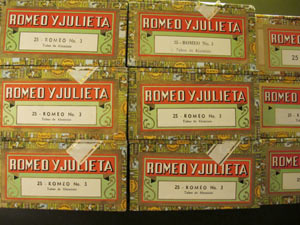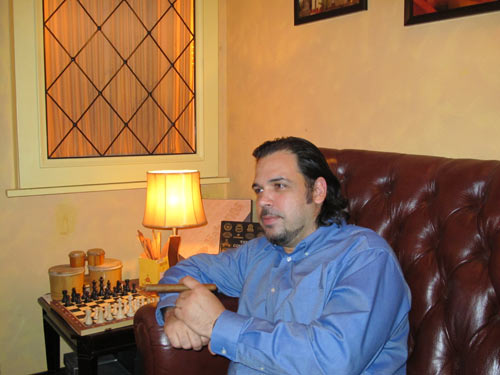Life and Leisure
Cuban puffs on success in China
By Mike Peters (China Daily)
Updated: 2010-10-01 11:21
 |
Large Medium Small |
|
|
A cigar export company representative explains why stogies are a tough sell in the largest smoking market in the world. Mike Peters lights up
When Omar Leon Sanchez was offered his job in 2002 as chief representative in China of Habanos S.A., Cuba's top cigar export company, he had to face his potential new employers with a small problem.
"I don't smoke," the Havana native recalls telling them. "And I don't really plan to start smoking cigars for the sake of this job.
"The boss told me it was fine," Sanchez says eight years later. "But he said to call him in a year and let him know if I was still not smoking cigars."
Sanchez had every reason to think he could resist temptation. He had grown up in Cuba, smelling his father and uncles' cigar smoke but never tried smoking.
This time, however, it was different. How could he sell something he'd never even sampled?
"I went home to my father and said, 'OK, teach me how to smoke,'" says Sanchez.
He learned slowly, sampling different kinds of tobacco.
"I found it attractive," he concedes.
|
 Classic stories were read to workers on the factory floor as they made cigars, among them Romeo and Juliet - which inspired a famous brand. [Mike Peters/ China Daily] |
"It's a natural product you can relax with, like a good wine or a good coffee," he says, one that has been part of his native culture for more than 100 years.
Before working for Habanos, Sanchez had been in Beijing for a few years as a language student and a restaurant entrepreneur, but he wanted to bring a Cuban product here.
He looked at rum, coffee and even marble.
"I didn't really consider cigars, because I knew that was run by companies with monopolies on both sides (Habanos in Cuba and China Tobacco in China)," he says.
But when the company approached him, the opportunity seemed right.
Sanchez's China connection started when he was a boy. He had Chinese neighbors in Havana.
"I started visiting Chinatown - before 1959, Havana had the biggest Chinatown in Latin America, I think," he says.
Young Omar Leon roamed the area happily, sampling the food and becoming addicted to wushu (kungfu) and Bruce Lee movies.
After the revolution, businesses were nationalized and Chinese workers moved on to San Francisco and elsewhere.
Havana's Chinatown faded, but was then revived through public efforts in 1984, a revitalization project Sanchez was part of.
Eventually the connections Sanchez made during the project led him to a scholarship in an exchange program, and from 1992 to 1996 he studied Chinese in Beijing.
He was hooked, and today he savors connecting the two cultures he loves.
"When we started in 2002, the people we saw smoking cigars were mostly foreigners," he says.
"Now the buyers in China are about half locals and half foreigners. And on an individual basis, locals buy more," he adds.
Urban cigar clubs have been a popular marketing tool, he says, as well as special-event dinners. The St. Regis, the Kempinski and other top hotels in China's biggest cities now boast cigar shops with a broad range of price and quality. A medium-size Montecristo No 2, on the relatively inexpensive but still respectable end of the scale, costs about 200 yuan ($29) .
The Chinese market is attractive right now as sales of Cuban cigars have declined around the world in recent years, due to the global economic crisis and anti-smoking campaigns. In June, the Cuban government reported that the just-completed harvest of the country's finest tobacco fell 14 percent from 2009.
There is a big cigar culture in Hong Kong, where the market for such lifestyle items has been established for many years, but initially cigars, were not seen as a luxury product on the Chinese mainland, Sanchez says.
Cigars, weren't totally foreign on the mainland, however, according to Sanchez.
"There are famous pictures of Mao smoking cigars, and of course similar pictures of Fidel and Che," he says.
These days it's a sign of a good lifestyle, he says, and that resonates with locals who are riding a booming economy.
"A fine cigar is a perfect end to a good dinner," he says. "It's a treat or something you save for a celebration."
That's part of the social cigar culture, he says. But another part is private - the opportunity to relax and think alone.
"Whether you are focusing on a project or study, or you just want to clear your mind, a good cigar can do this," says Sanchez.
Sanchez concedes that smoking of any sort can be potentially harmful, but is quick to add that smoking cigars properly (not inhaling) is probably healthier than smoking cigarettes.
Q & A
Omar Leon Sanchez on cigar culture in China
Q. China is the world's biggest market for smokers. So that makes your job easy, right?
A. Not really. China is big for cigarette smokers - that is mass demand, a continuous habit. You don't smoke cigars that way.
Part of our new market is Chinese cigarette smokers, but many of our new customers have never smoked. Cigarettes are like fast food and cigars are like a gourmet meal. So it's often easier to become a cigar smoker if you haven't smoked cigarettes.
Q. How long can you keep a cigar?
A. Properly stored, they can be kept for decades. In America, they are still smoking cigars from 1959 and before, but that is a special case. (Laughs)
Q. Do you need to do anything special to store cigars in China?
A. Cigars should be kept in the coolest place in the house. Humidity is important, especially in dry places like Beijing and especially in winter. Cigar storage cases, called humidors, have a compartment of water for that reason, but you still have to check your cigars every three days.
Q. Does size matter?
A. Maybe if you are taking a picture of yourself holding a cigar. For smoking, it just depends on how much time you have. A small cigar is good for a business meeting; you can smoke it in half an hour. If you are watching a big football game with friends and drinking rum, you want a big cigar.
Q. Why are some Cuban cigars named after literary figures?
A. In the factories, there is traditionally a lector who reads to the workers, usually a novel. Stories such as Romeo and Juliet and The Count of Monte Cristo are popular and have lent their names to cigar brands.
Q. Do you expect to see Cuban cigars in the US again in your lifetime?
A. Yes, I think there will be a change. We are looking forward to that and we want to be ready. The US is the biggest cigar market in the world.
